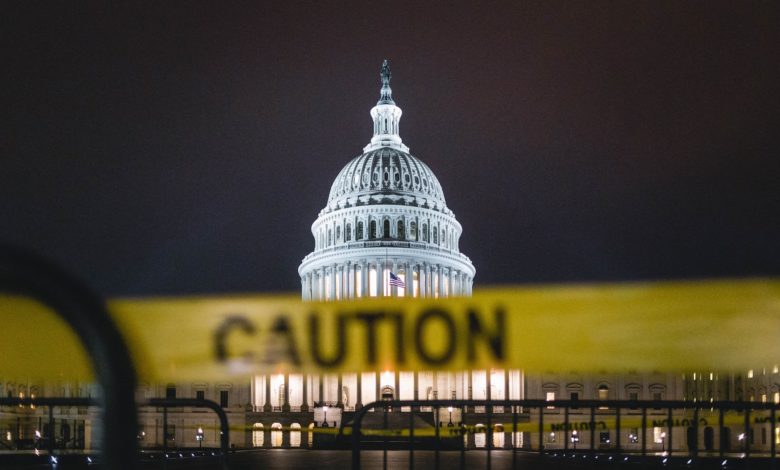The looming threat of a government shutdown around the corner is casting a shadow of uncertainty over the nation. With Congress deeply divided along partisan lines and struggling to find common ground on budget issues, the possibility of failing to pass a budget bill by the fiscal year's end on September 30th is becoming increasingly likely. If Congress cannot reach an agreement, a government shutdown will commence on October 1st, 2023. In this article, we will explore the potential impacts of such an event on the economy and provide actionable steps individuals can take to prepare.
Potential Impacts of a Government Shutdown
A government shutdown presents a multi-faceted impact on the economy. Firstly, it acts as a brake on economic growth by disrupting business operations and consumer spending, ultimately causing a reduction in the overall economic growth rate. Secondly, the shutdown translates to job losses, not only directly impacting federal employees through furloughs but also causing potential job losses in the private sector due to the disruption of vital government services.
Additionally, the uncertainty and financial strain caused by the shutdown trigger a decrease in spending and dampening overall economic activity. This chain reaction also extends to the stock market, introducing volatility due to the uncertainty and disruption caused by the shutdown, impacting both investors and businesses relying on stable market conditions for planning and growth strategies.
Preparing for a Government Shutdown
1. Maintain a Cash Reserve: Always have a cash reserve to cover unexpected expenses, ensuring financial stability during a potential government shutdown.
2. Budget Review: Review your budget and ensure you have enough funds to cover essential expenses during a potential shutdown.
3. Reduce Spending: Cut back on non-essential expenses to preserve cash reserves and mitigate the impact of a government shutdown on your finances.
4. Stay Informed: Stay updated with the latest news regarding the potential government shutdown, allowing you to plan and adjust your budget accordingly.
The Impact
During a government shutdown, various groups could feel the repercussions. Federal employees, facing furloughs, endure financial hardships due to delayed paychecks, and this financial strain extends to impact their families and communities. Government contractors, an integral part of government operations, also bear the brunt of a shutdown, experiencing furloughs and potential income loss, which significantly affects their livelihoods. Moreover, the economic disruptions triggered by the shutdown can result in revenue declines for businesses heavily reliant on government contracts, subsequently impinging on consumers' access to vital services and goods. The interconnectedness of these sectors underscores the wide-reaching effects a government shutdown can have on both individuals and the broader economy.
Protecting Your Portfolio
To safeguard your portfolio from potential government shutdowns, consider diversifying your investments, focusing on long-term investments that are less volatile, and maintaining a cash reserve for financial stability.
Historical Examples and Market Impact
In the history of the United States, there have been 22 government shutdowns, showcasing the recurring struggle in achieving budgetary agreements. The longest endured for a 35-day stretch during the period spanning 2018 to 2019. During these shutdowns, the stock market tends to experience adverse effects, with the prominent S&P 500 index, a key indicator of market performance, typically witnessing a decline averaging around 1.2% over the course of the last five shutdowns.
This decline in market performance is a reflection of the uncertainty and apprehension around the financial landscape during these events. This uncertainty triggers a cautious approach among investors, leading to sell-offs and reduced investments, resulting in a dampened stock market. However, history shows that the stock market tends to recover relatively quickly once the shutdown concludes and a budget is secured.
Final Thoughts
In summary, a government shutdown is a potentially disruptive event that raises concerns about its impact on the US economy and stock market. Understanding the potential effects is important as it can enable investors to make informed decisions and take proactive measures to reduce financial risks. Staying informed, prepared, and adaptive is essential to navigate the uncertainty and contribute to a more stable financial environment.
Disclaimer
This website is a wholly owned subsidiary of SCD Media, LLC, herein referred to as Smallcaps Daily. Our publications are a commercial advertisement and are for general information purposes ONLY. We are engaged in the business of marketing and advertising companies for monetary compensation. We may receive compensation for this article on a PPC basis as an affiliate. Never invest in any stock featured on our site or emails unless you can afford to lose your entire investment. The disclaimer is to be read and fully understood before using our services, joining our site or our email/blog list as well as any social networking platforms we may use. PLEASE NOTE WELL: Smallcaps Daily and its employees are not a Registered Investment Advisor, Broker Dealer or a member of any association for other research providers in any jurisdiction whatsoever.Release of Liability: Through use of this website viewing or using you agree to hold Smallcaps Daily, its operators owners and employees harmless and to completely release them from any and all liability due to any and all loss (monetary or otherwise), damage (monetary or otherwise), or injury (monetary or otherwise) that you may incur. The information contained herein is based on sources which we believe to be reliable but is not guaranteed by us as being accurate and does not purport to be a complete statement or summary of the available data. Smallcaps Daily encourages readers and investors to supplement the information in these reports with independent research and other professional advice. All information on featured companies is provided by the companies profiled, or is available from public sources and Smallcaps Daily makes no representations, warranties or guarantees as to the accuracy or completeness of the disclosure by the profiled companies. None of the materials or advertisements herein constitute offers or solicitations to purchase or sell securities of the companies profiled herein and any decision to invest in any such company or other financial decisions should not be made based upon the information provided herein. Instead Smallcaps Daily strongly urges you conduct a complete and independent investigation of the respective companies and consideration of all pertinent risks. Readers are advised to review SEC periodic reports: Forms 10-Q, 10K, Form 8-K, insider reports, Forms 3, 4, 5 Schedule 13D. Smallcaps Daily is compliant with the Can Spam Act of 2003. Salesparq, LLC does not offer such advice or analysis, and Smallcaps Daily further urges you to consult your own independent tax, business, financial and investment advisors. Investing in micro-cap and growth securities is highly speculative and carries and extremely high degree of risk. It is possible that an investors investment may be lost or impaired due to the speculative nature of the companies profiled. The Private Securities Litigation Reform Act of 1995 provides investors a safe harbor in regard to forward-looking statements. Any statements that express or involve discussions with respect to predictions, expectations, beliefs, plans, projections, objectives, goals, assumptions or future events or performance are not statements of historical fact may be forward looking statements. Forward looking statements are based on expectations, estimates, and projections at the time the statements are made that involve a number of risks and uncertainties which could cause actual results or events to differ materially from those presently anticipated. Forward looking statements in this action may be identified through use of words such as projects, foresee, expects, will, anticipates, estimates, believes, understands, or that by statements indicating certain actions & quote; may, could, or might occur. Understand there is no guarantee past performance will be indicative of future results.In preparing this publication, Smallcaps Daily, has relied upon information supplied by its customers, publicly available information and press releases which it believes to be reliable; however, such reliability cannot be guaranteed. Investors should not rely on the information contained in this website. Rather, investors should use the information contained in this website as a starting point for doing additional independent research on the featured companies. Smallcaps Daily has not been compensated for this article. The advertisements in this website are believed to be reliable, however, Smallcaps Daily and its owners, affiliates, subsidiaries, officers, directors, representatives and agents disclaim any liability as to the completeness or accuracy of the information contained in any advertisement and for any omissions of materials facts from such advertisement. Smallcaps Daily is not responsible for any claims made by the companies advertised herein, nor is Smallcaps Daily responsible for any other promotional firm, its program or its structure. Smallcaps Daily is not affiliated with any exchange, electronic quotation system, the Securities Exchange Commission or FINRA.





